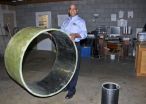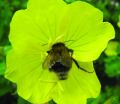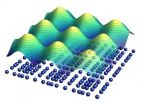(Press-News.org) Insomnia sufferers in England could have greater access to successful treatment, thanks to a training programme developed as part of trials of Cognitive Behaviour Therapy for Insomnia (CBTi), funded by the Economic and Social Research Council (ESRC).
In Britain, people report having insomnia more often than any other psychological condition, including anxiety, depression and even pain, according to the Office of National Statistics. Yet the only treatment offered in most doctors' surgeries is a course of sleeping tablets.
"It is well known that sleeping pills can be addictive and their efficacy wears off over time," says Professor Kevin Morgan of Loughborough University who led the trials. "It is also known that CBTi can treat insomnia more effectively than drugs in the long term. However, until now major barriers to delivering CBTi have included a shortage of trained therapists and the absence of an appropriate clinical service through which to deliver treatments."
The trials proved that CBTi can benefit people with insomnia at any age. It can even be successful for sufferers with other chronic illnesses, as well as those who are particularly prone to insomnia. The most unexpected outcome of the research is the success of the CBTi training which was developed, initially, to enable participants to take part in the project. Since the end of the trials, Professor Morgan's group have delivered training for therapists in Health Authorities all over the country. "Every Parkinson's disease nurse in Scotland has been trained in CBTi and new courses are planned for Oxford and South Yorkshire", Professor Morgan says.
"You see, we had this accumulated wisdom on delivering CBTi as part of our trials. Now, by rolling out this training programme for regional Health Authorities, we have effectively overcome one of the chief barriers to giving CBTi for insomnia: the lack of skills in the workforce."
"CBTi is not a difficult concept", Professor Morgan points out. "It is a question of encouraging insomnia sufferers to think about their sleep in a different way and to change the habits that bring about their sleep problems".
The trials involved delivering the principles of cognitive behavioural management for insomnia, in a structured programme of 'self-help'. Patients were given six weekly booklets that explained how sleep works and how to gain control of it. They were given access to a helpline, staffed by 'expert patients' who were themselves insomnia sufferers.
Professor Morgan states, "The booklets teach us how to 'retrust' the bedroom and relearn how to link it with sleep. In the same way that we do with food, for example thinking about entering a restaurant can trigger your mouth to water and anticipate food, so, entering your bedroom should bring on a desire to sleep".
"It is a question of giving people the tools to break the vicious circle," Professor Morgan says. "Most sufferers have never considered that they can do anything about their insomnia. But now, with the possibility of training therapists to deliver self-help CBTi from doctors' surgeries that is set to change."
###
For further information contact:
Professor Kevin Morgan
Email: K.Morgan@lboro.ac.uk
Telephone: +44 (0)1509 222288
ESRC Press Office:
Jeanine Woolley
Email: jeanine.woolley@esrc.ac.uk
Telephone 01793 413119
Melanie Knetsch
Email: melanie.knetsch@esrc.ac.uk
Telephone 01793 413049
NOTES FOR EDITORS
1. This release is based on findings and outcomes of a large interdisciplinary project 'Optimising Quality of Sleep Among Older People in the Community and Care Homes: An integrated approach,' which was funded by the Economic and Social Research Council and carried out by the University of Surrey (Professor Sara Arber, Professor Debra Skene & Dr Ingrid Eyers), the University of Bath (Professor Roger Orpwood), King's College London (Professor David Armstrong) and Loughborough University (Professor Kevin Morgan).
2. The trial that was part of this project evaluated the effectiveness of a self-help cognitive behavioral intervention to improve sleep quality among older adults reporting insomnia symptoms associated with chronic disease. Self-help participants received six consecutive booklets, at weekly intervals, providing structured advice on key components of cognitive behavioral therapy for insomnia (CBTi including self-monitoring, sleep restriction, stimulus control procedures and cognitive strategies), plus access to a telephone helpline. Control group participants received a single sheet of advice, detailing standard sleep hygiene measures. The primary outcome was sleep quality, measured by the Pittsburgh Sleep Quality Index. Secondary outcomes were the Insomnia Severity Index, the subjective sleep efficiency index, and the Fatigue Severity Scale.
3. The Economic and Social Research Council (ESRC) is the UK's largest organisation for funding research on economic and social issues. It supports independent, high quality research which has an impact on business, the public sector and the third sector. The ESRC's total budget for 2012/13 is £205 million. At any one time the ESRC supports over 4,000 researchers and postgraduate students in academic institutions and independent research institutes. More at www.esrc.ac.uk
Trained NHS therapists can help insomniacs
2012-08-17
ELSE PRESS RELEASES FROM THIS DATE:
UA engineering professor uses aerospace materials to build endless pipeline
2012-08-17
TUCSON, Ariz. (August 17, 2012) -- Mo Ehsani, Professor Emeritus of Civil Engineering at the University of Arizona, has designed a new, lightweight underground pipe he says could transform the pipeline construction industry.
Instead of conventional concrete or steel, Ehsani's new pipe consists of a central layer of lightweight plastic honeycomb, similar to that used in the aerospace industry, sandwiched between layers of resin-saturated carbon fiber fabric.
In combination, these materials are as strong, or stronger, than conventional steel and concrete pipes, which ...
It must be important but what does it do? The strange case of UCP2
2012-08-17
When uncoupling proteins are active, mitochondria produce heat instead of ATP. This may be useful under certain circumstances, such as when an animal is hibernating. But non-hibernating animals also have them. Particularly poorly understood is the uncoupling protein UCP2. Elena Pohl and colleagues at the University of Veterinary Medicine, Vienna, show that the protein occurs mainly in cells of the immune system. The group's highly provocative findings are published in the online journal PLOS ONE.
Mitochondria represent the powerhouses of the eukaryotic cell. They ...
Iconic Darwin finch genome sequenced in Genome 10K international collaboration
2012-08-17
Santa Cruz, California—Scientists have sequenced the genome of one of the iconic Galapagos finches first described by Charles Darwin. The genome of the medium ground finch (Geospiza fortis) is among the first of a planned 100 genomes of vertebrate species to be sequenced and released by an international collaboration between the Genome 10K project and BGI.
This finch genome, the first of the BGI-Genome 10K collaboration to be made available through the UCSC Genome Browser, represents both a scientific and a symbolic advancement, according to Duke University associate professor ...
Magnetic turbulence trumps collisions to heat solar wind
2012-08-17
New research, led by University of Warwick physicist Dr Kareem Osman, has provided significant insight into how the solar wind heats up when it should not. The solar wind rushes outwards from the raging inferno that is our Sun, but from then on the wind should only get cooler as it expands beyond our solar system since there are no particle collisions to dissipate energy. However, the solar wind is surprisingly hotter than it should be, which has puzzled scientists for decades. Two new research papers led by Dr Osman may have solved that puzzle.
Turbulence pervades ...
Wild pollinators support farm productivity and stabilize yield
2012-08-17
Most people are not aware of the fact that 84% of the European crops are partially or entirely dependent on insect pollination. While managed honeybees pollinate certain crops, wild bees, flies and wasps cover a very broad spectrum of plants, and thus are considered the most important pollinators in Europe.
The serious decline in the number of managed honeybees and wild bees reported in Europe over the last few decades has the potential to cause yield decreases with threats to the environment and economy of Europe. The future of the pollination services provided by bees ...
War is not necessarily the cause of post-traumatic stress disorder
2012-08-17
A large-scale survey of the mental condition of military personnel before, during and after their posting to Afghanistan has proved thought-provoking. In total, 746 Danish soldiers took part in the survey. The soldiers completed a questionnaire five times in all – before their posting, during their time in Afghanistan and three times after their return to Denmark.
Professor Dorthe Berntsen of the Center on Autobiographical Memory Research – CON AMORE, Department of Psychology, Aarhus University, Business and Social Sciences, is responsible for the study, together with ...
Photographic cholesterol test
2012-08-17
Researchers in India have developed a total cholesterol test that uses a digital camera to take a snapshot of the back of the patient's hand rather than a blood sample. The image obtained is cropped and compared with images in a database for known cholesterol levels.
Writing in the International Journal of Medical Engineering and Informatics, N.R. Shanker of the Sree Sastha Institute of Engineering and Technology and colleagues describe how they have developed a non-invasive way to test cholesterol levels in patients at increased risk of heart disease. Their approach ...
Regions vary in paying prisoners to participate in research
2012-08-17
TORONTO, Aug. 17, 2012--When members of the public participate in research studies, they are often given incentives – such as cash or gift cards for food – as compensation or reimbursement for their time and effort. Not so for Canada's prison population. A new analysis shows that there is inconsistency in how and when incentives are used for research participants under criminal justice supervision.
Of the provinces, territories and federal government, only two jurisdictions have written policy around the use of research incentives, according to a national study led by ...
Constructive conflict in the superconductor
2012-08-17
Whether a material conducts electricity without losses is not least a question of the right temperature. In future it may be possible to make a more reliable prediction for high-temperature superconductors. These materials lose their resistance if they are cooled with liquid nitrogen, which is relatively easy to handle. An international team, in which physicists of the Max Planck Institute for Solid State Research in Stuttgart played a crucial role, has now discovered that this form of superconductivity competes with charge density waves, i.e. with a periodically fluctuating ...
A urine based 'potion' can act as a CO2 absorbent
2012-08-17
VIDEO:
A Spanish researcher has proposed human, agricultural and livestock waste, such as urine, as a way to absorb CO2.
Click here for more information.
The ocean, the ground, rocks and trees act as carbon drains but are far from places where greenhouses gases are concentrated, especially CO2. A Spanish researcher has proposed human, agricultural and livestock waste, such as urine, as a way to absorb this gas.
Absorbing the large quantities of carbon dioxide and other greenhouse ...


